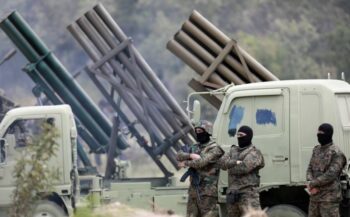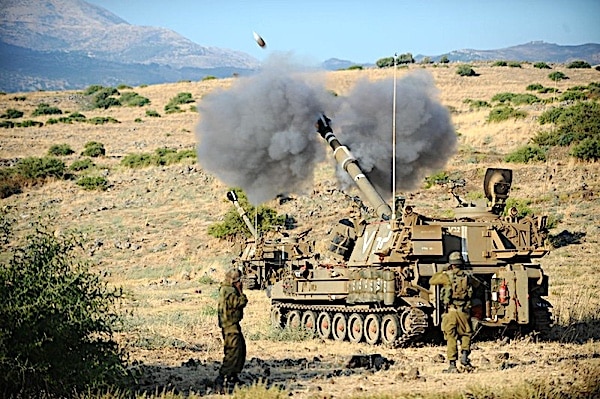Israel’s genocide in Gaza is catapulting the Middle East, and the broader world, toward further destabilization. Only a few months ago, open war between Israel and Iran seemed like a possibility. Now, all-out war between Israel and Hezbollah may send the region careening into further chaos and uncertainty.
Following the Hamas-led October 7 attacks, military clashes between the Israel Defense Forces (IDF) and Hezbollah along the Lebanon-Israel border have been nearly daily occurrences. Hundreds of thousands have been displaced. In recent weeks, however, things have escalated.
On June 7, Hezbollah declared that, for the first time in its history, it had used an anti-aircraft missile to force an Israeli jet to retreat from Lebanese airspace. As William Christou writes in The New Arab, Hezbollah’s use of anti-aircraft weaponry is a “revelation.” Christou explains:
Prior to the advent of the new anti-aircraft missile, Hezbollah’s most advanced air defence feat was the downing of an Israeli helicopter in the 2006 war—something which does not require advance weaponry. Hezbollah’s possession of more sophisticated anti-aircraft technology would mean Israel could not conduct aerial sorties over the country with abandon as it previously had.
On June 18, amid intensifying exchanges between Hezbollah and the IDF, Hezbollah released a 10-minute video showing that one of its drones had covertly entered the northern city of Haifa, drifted over civilian areas, identified military targets, and returned to Lebanon. The message was clear:
The drone video proved to Israel that Hezbollah had the capacity to penetrate deep into its territory without being detected. Though this was a surveillance drone, the prospect of a suicide drone or drones carrying warheads hovering over Haifa has a significant psychological potency to both the civilian residents of Haifa and the Israeli military.
The next day, Hezbollah’s leader Hassan Nasrallah stated that the group has prepared a “complete bank of targets” in Israel should the war expand.
The Israeli military appears undeterred. Following Hezbollah’s publication of the drone video, the IDF asserted that “operational plans for an offensive in Lebanon were approved and validated.” Israeli Foreign Minister Israel Katz added:
We are getting very close to the moment of deciding on changing the rules of the game against Hezbollah and Lebanon… In an all-out war, Hezbollah will be destroyed and Lebanon will be severely beaten.
Israel appears to be laying the groundwork for an attack on Lebanon, despite the fact that a war with Hezbollah would almost certainly create a multi-front conflict with allied groups in Iraq, Syria, and Yemen, all of whom would receive substantial Iranian backing. The level of hubris is astonishing. Israel has been unable to defeat the Palestinian resistance in Gaza—despite its merciless onslaught against Gazans, Hamas is stronger now than it was on October 7—yet the IDF is preparing for an all-out war against Hezbollah. Benjamin Netanyahu has even said,
We can fight on several fronts and we are prepared to do that.
To pull the region back from a wider war, the killing in Gaza must end. Hezbollah leader Hassan Nasrallah said as much at the beginning of the year:
If the Americans had a brain… they would understand very well that security of the Red Sea, the calmness of the front with Lebanon, the situation in Iraq, all developments in the region rely on one issue: putting an end to the aggression on Gaza.
Far from ending the genocide in Gaza, the Israeli military continues its brutal assaults on the besieged strip of land while retaining the military and diplomatic backing of many Western states, including Canada.
Over almost nine months, Israeli assaults have killed tens of thousands of Palestinians (disproportionately women and children) and displaced almost two million. Israel’s vicious actions have prompted military responses from resistance groups across the region, including in Iraq and Yemen.
Canada has backed Israel against these resistance groups, especially the Houthi-led government of Yemen. In December 2023, Canada joined the U.S.-led Operation Prosperity Guardian, a failed mission to end Houthi strikes on Israeli-linked ships in the Red Sea. One month later, Canadian Armed Forces personnel deployed in support of the U.S.-UK bombing of Yemen. In a statement following the bombings, the government of Canada “condemn[ed] the reckless Houthi attacks against commercial ships and crew operating in the Red Sea.” In February, Canada again participated in the bombing of cities in Yemen.

Hezbollah carrying out a training exercise in Aaramta, Jezzine, southern Lebanon, May 2023. (Photo: Tasnim News Agency/Wikimedia Commons)
In April 2024, Israel’s reckless decision to bomb the Iranian consulate in Damascus, killing at least eight Islamic Revolutionary Guard Corps (IRGC) officers and two Syrian civilians, almost led to full-blown war with Iran. The Iranian government responded with a pre-announced strike on military targets within Israel, a reaction that sidestepped further escalation while demonstrating Iran’s willingness to hit Israel directly.
Despite Israel’s provocations against Iran, Ottawa sided unequivocally with the Israeli government. This despite the fact that the Israeli strike also damaged the Canadian embassy, which though closed, remains the property of the government of Canada. Foreign Affairs Minister Mélanie Joly could only bring herself to reference Israel’s damaging of the Canadian embassy in the passive voice:
What I can tell you is indeed we have an embassy in Syria that was not occupied because we’ve closed this embassy, and indeed it is an embassy that has been damaged.
Following Tehran’s retaliation, the Government of Canada imposed further sanctions against Iran, claiming “[the] attack against Israel is yet another example in a pattern of Iran’s malign influence in the region.”
While backing Israel in its conflicts with Iran and Yemen, Ottawa has also approved a record number of arms sales to Israel, with approvals hastening after October 7. According to Michael Bueckert, vice president of Canadians for Justice and Peace in the Middle East (CJPME),
It’s almost as if Canada is accelerating its arms export authorization process amid a genocidal campaign.
In March 2024, amid global uproar over Israeli war crimes, the Trudeau government claimed to be ending arms sales to the IDF. This proved to be untrue, as the pledge to end military exports did not apply to hundreds of already approved arms deals. Canada remains an active participant in the horrors perpetrated against Gaza.
Meanwhile, Canadian police have attempted to suppress anti-genocide activism. For example, a June 2024 piece in The Breach details an expansive police operation in Toronto to infiltrate and destroy protests against Canadian participation in the genocide of Palestinians. Under an operation titled Project Resolute, police utilized heavy-handed tactics to disrupt anti-genocide organizing, including “pre-dawn raids, snatching people on the street, trying to turn arrested individuals into informants, showing up unannounced at university lectures, and capitalizing on years of surveilling activist movements.”
Since October 7, the Canadian government has participated in military assaults against Palestinians as well as regional forces opposed to the genocide in Gaza. Now, Israel’s war is threatening to spill into Lebanon, and Ottawa is actively enflaming tensions through its participation in the war on Gaza and its refusal to pressure Israel to relent.
Rather than attempting to defuse the conflict (the first step of which would require Canada ending its participation in the Gaza genocide), Ottawa seems resigned to the prospect of a wider war.
On June 21, Israel Katz spoke with Joly, who told Katz that Ottawa had dispatched military forces to the region for “the largest evacuation we have ever undertaken.” At the same time, Katz told Joly that, if Ottawa wants to prevent a wider war, she needs to “put pressure on Hezbollah’s Iranian backers.” Canada’s foreign minister apparently did not object.
A few days later, Joly urged Canadians to leave Lebanon, stating:
The security situation in Lebanon is becoming increasingly volatile and unpredictable due to sustained and escalating violence between Hezbollah and Israel and could deteriorate further without warning.
In her statement, Joly does not mention the root cause of the “volatile and unpredictable situation”—Israel’s violent assault on Gaza, in which Canada is complicit.
If the Hezbollah-Israel conflict spirals out of control, Canadians must remember that their government had myriad opportunities to end its military and diplomatic support for Israel and instead promote genuine efforts for regional peace. Instead, Canada has backed Israel to the hilt, helping push the region to the brink of all-out war.

